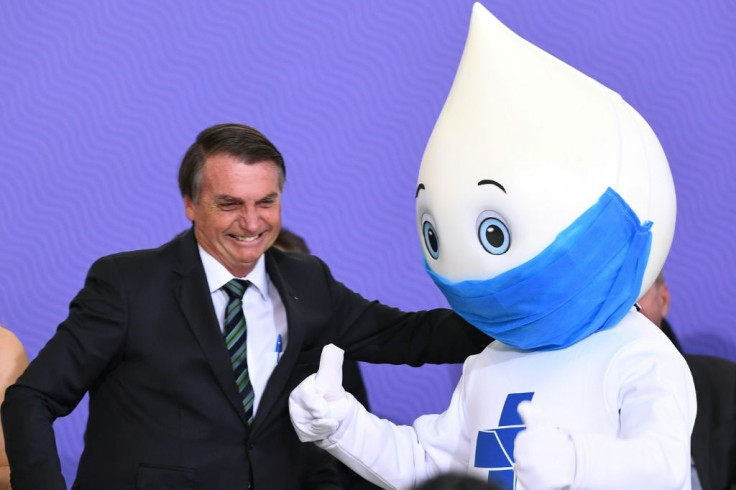Bolsonaro Under Fire Over Brazil's Troubled Vaccine Roll-out
Brazil prides itself on its world-leading immunization experts, medical institutions and vaccine research, but President Jair Bolsonaro's government has been accused of having a chaotic plan to inoculate against Covid-19.
Bolsonaro finally launched a mass immunization campaign on Wednesday that aims to vaccinate 70 percent of the population within 16 months, but the president has been accused of repeatedly sabotaging his own program.
On Thursday he released 20 billion reais ($3.9 billion) to buy vaccine doses in a country that has already lost more than 184,000 people to the coronavirus -- the second highest national total in the world.
Later that day, the government announced that daily deaths had risen above 1,000 for the first time since September.
Analysts say the country took too long to formulate an immunization plan, lacked a precise start date and has no clear vaccine purchase and distribution strategy.
Bolsonaro, who caught the virus in July and once described it as "a little cold," announced he would not be getting an injection himself.
And he mocked the potential side-effects of the vaccine type developed by US pharmaceutical giant Pfizer and German biotechnology company BioNTech, which has already been rolled out in the US and Britain.
"In the Pfizer contract it's very clear: 'we're not responsible for any side effects.' If you turn into a crocodile, it's your problem," Bolsonaro said on Thursday.
"If you become superhuman, if a woman starts to grow a beard or if a man starts to speak with an effeminate voice, they will not have anything to do with it," he said, referring to the drug manufacturers.
It seems to be having an effect: according to a poll by Datafolha, the number of people prepared to be vaccinated from Covid-19 fell from 89 percent in August to 73 percent in December.
Bolsonaro said the vaccine wouldn't be mandatory, but the Supreme Court contradicted him -- adding though that no-one could be "forced" to take it.
The government is negotiating the purchase of 350 million doses of coronavirus vaccines for 2021.

The figure includes 210 million of the Oxford-AstraZeneca vaccine that is largely made in Brazil by the Fiocruz institute, 70 million of Pfizer's vaccine and another 42 million of the one produced by the international conglomerate Covaz.
However, none of those, nor the CoronaVac produced by Chinese laboratory Sinovac, which is being tested in Sao Paulo, have yet asked the regulatory agency Anvisa for emergency use authorization -- which they will need before they can start vaccinating.
"Bolsonaro has lost a lot of time with his denials, with his political battles with state governors over quarantine measures, with his campaign against the vaccine and it being mandatory," Jose David Urbaez, from the Brazilian Infectiology Society, told AFP.
"To start a program like this you need to have negotiated with the pharmaceutical companies a long time ago" and organized buying syringes, the cold chain and the human resources needed, he added.
For Luiz Gustavo de Almeida, a microbiologist at the University of Sao Paulo, Brazil "missed the first train" of Pfizer/BioNTech and Moderna vaccines delivered to the US.
"They'll have to wait for the second train when the government will finally be able to acquire vaccines and that won't be until March, April or May 2021. Those who aren't priorities probably won't start receiving them until 2022."
The government says it expects to vaccinate the most at-risk groups in four months -- once it has approval for a vaccine.
Bolsonaro is also embroiled in a public spat over vaccines with Sao Paulo state governor Joao Doria, who is expected to challenge him in the 2022 presidential election.
Doria has been pushing to start vaccinating his state from January 25 with CoronaVac, which has begun to be made locally by Sao Paulo's Butantan Institute.
Bolsonaro, though, has consistently tried to discredit "Doria's Chinese vaccine" even though his government is due to purchase millions of CoronaVac doses.
"Traditionally in Brazil infectious diseases were always managed and coordinated centrally, with great results," said Urbaez.
"The national plan will only work when everyone, federal and state governments, agree... Every backward step costs us weeks of immunizations."
© Copyright AFP {{Year}}. All rights reserved.




















